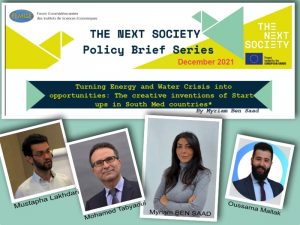 Micro, small and medium enterprises (MSMEs) constitute about 95% of total enterprises in the South Med region and are considered the driving forces of economic growth, job creation and green and inclusive growth. Entrepreneurs, particularity start-ups, still face numerous challenges when it comes to establishing, promoting and running their businesses. Providing them with support through innovative initiatives and enhancing the ecosystem where they operate will contribute to their development. In their turn, entrepreneurs will contribute to achieving several of the Sustainable Development Goals (SDGs).
Micro, small and medium enterprises (MSMEs) constitute about 95% of total enterprises in the South Med region and are considered the driving forces of economic growth, job creation and green and inclusive growth. Entrepreneurs, particularity start-ups, still face numerous challenges when it comes to establishing, promoting and running their businesses. Providing them with support through innovative initiatives and enhancing the ecosystem where they operate will contribute to their development. In their turn, entrepreneurs will contribute to achieving several of the Sustainable Development Goals (SDGs).
It is in this context that the Next Society (TNS) project and FEMISE decided to launch this initiative to produce “The Next Society Policy Briefs Series”. This series of briefs aims to better understand the challenges faced by entrepreneurs (through the lens of the entrepreneurs themselves) and to provide tailor-made operational policy recommendations. These briefs are based on collaborative work and exchange of knowledge and experience between the researcher(s)/author(s) and the entrepreneur(s), many of which have benefited from TNS project, ensuring their relevance and impact.
The seventh TNS/ FEMISE Policy Brief, entitled ” Turning Energy and Water Crisis into opportunities: The creative inventions of Start-ups in South Med countries “, by Myriam Ben Saad, University Panthéon-Sorbonne, is available here
 Summary:
Summary:
Energy and water security, two essential resources for human and economic development, are now more interdependent than ever. The impact of the climate change in the South Med region has revealed the need to act quickly and efficiently to mitigate negative effects and to address many challenges associated with increasing water scarcity and inefficient energy consumption. The pandemic provides a strategic opportunity for countries to reassess priorities and in particular to give more space to renewable resources (IEA, 2021). This is all the more relevant in the Mediterranean region, which includes some of the most attractive markets in terms of renewable energy (RECAI – Renewable Energy Country Attractiveness Index).
The objective of this policy brief is to assess the status of the water and energy sectors in the South Med region and to highlight the opportunities in terms of entrepreneurship and innovation, through the example of three start-ups from Algeria, Lebanon, and Morocco that benefited from THE NEXT SOCIETY project (funded by the European Commission). The transition to an environmentally and socially responsible model in the energy and water sectors must take advantage of innovative entrepreneurship. This paper analyses the motivations of Mediterranean entrepreneurs to create their start-ups, their innovations, the main challenges they faced and draws recommendations to support innovation and accelerate industrial and technological development in this region.
Watch this video by the author of the Brief and the entrepreneurs who are sharing their experiences, highlighting the challenges and providing recommendations and lessons learnt.
*This Policy Brief and this Video are produced as part of the series of TNS/FEMISE Policy Briefs on “Entrepreneurship in South Mediterranean Countries” that is undertaken in partnership between FEMISE and ANIMA Investment Network.
![]() *”This policy brief and this Video have been produced with the financial support of the European Union. The contents of these products are the sole responsibility of the authors and entreprenerus and can under no circumstances be regarded as reflecting the position of the European Union.”
*”This policy brief and this Video have been produced with the financial support of the European Union. The contents of these products are the sole responsibility of the authors and entreprenerus and can under no circumstances be regarded as reflecting the position of the European Union.”

